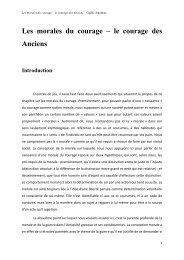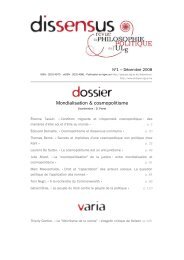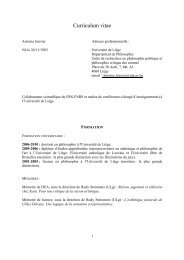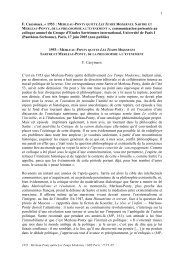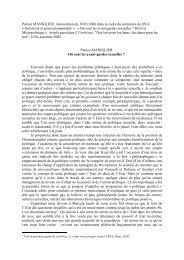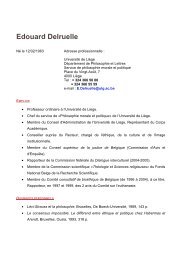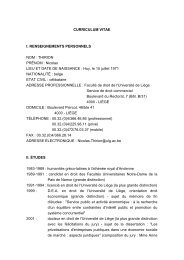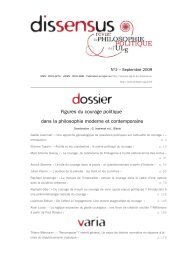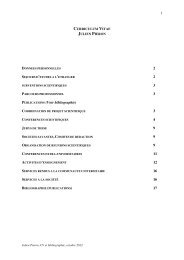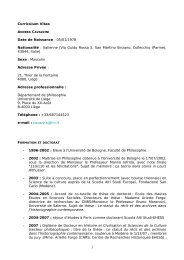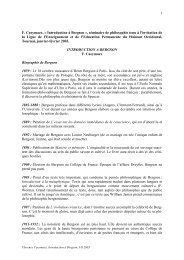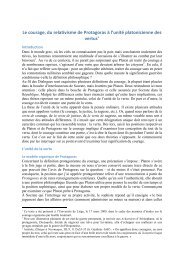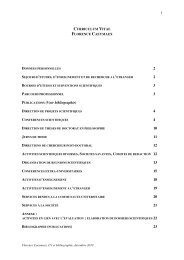Subjectivations politiques et économie des savoirs - Service de ...
Subjectivations politiques et économie des savoirs - Service de ...
Subjectivations politiques et économie des savoirs - Service de ...
Create successful ePaper yourself
Turn your PDF publications into a flip-book with our unique Google optimized e-Paper software.
– Revue <strong>de</strong> philosophie politique <strong>de</strong> l’ULg – N°5 – Mai 2013 – p. 140<br />
riches will have to be given to the state and hence contribute to the funding of common<br />
meals, festivals or public works. 61<br />
Plato’s way of limiting wealth un<strong>de</strong>rscores the limits of U.S. Presi<strong>de</strong>nt Obama’s<br />
<strong>de</strong>cision to cap senior bank executives’ salaries at 500,000$, for if we followed the<br />
Athenian stranger’s principle, the capping should have been fixed somewhere closer to<br />
80,000$. 62 Now, Plato would be perfectly capable of comprehending the fairly common<br />
objection that the capping of salaries (or the capping of wealth more generally) will<br />
necessarily un<strong>de</strong>rmine growth and dampen ambition: after all, this is precisely his<br />
point. Plato’s conception of a good economy is a no-growth economy (and here lies the<br />
radicalism and untimeliness of his work). If the city ought to grow, it is to grow in virtue<br />
and in virtue only. The restricting of wealth accumulation would contribute to this growth<br />
by forcing individuals to reorient their efforts and ambitions towards other purposes<br />
than money-making.<br />
One should note that, in the Laws (744c), the Athenian stranger is not only concerned<br />
with preventing the wealthy from g<strong>et</strong>ting richer, but also with preventing the « poorest »<br />
from g<strong>et</strong>ting poorer (i.e. from falling below what is <strong>de</strong>emed necessary for comfortable<br />
living and a proper cultivation of one’s land). Limiting the <strong><strong>de</strong>s</strong>ire for money in those<br />
« b<strong>et</strong>ter off » is, in fact, inseparable from the prevention of poverty in the « worse off »:<br />
a « policy of mo<strong>de</strong>ration », the Athenian observes, is « dictated by the conviction that<br />
poverty is a matter of increased greed rather than diminished wealth » (Laws 736e).<br />
Now, it may be slightly unwarranted here to speak of the « rich » and « poor », or the<br />
« b<strong>et</strong>ter off » and the « worse off », given that the objective of the economic<br />
arrangements in Magnesia is precisely to avoid the creation of such categories in the<br />
first place. Plato sees a close connection b<strong>et</strong>ween economic inequality and instability –<br />
wh<strong>et</strong>her it is rooted in the arrogance and idleness of the rich or in the resentment and<br />
suffering of the poor (e.g. Republic 422e). 63 One of the goals of mo<strong>de</strong>rating citizens’<br />
61<br />
62<br />
63<br />
Laws 745a. This measure applies to each property class.<br />
This amount would be obtained if one took 19,000$ as representing the income of the bottom 20% of<br />
American households. This amount is based on the US Census Bureau’s « Current Population Survey »<br />
(2007). Even if we took the median annual household income of 50,000$, the capped salary of<br />
executives should still be only 200,000$.<br />
http://pubdb3.census.gov/macro/032007/hhinc/new05_000.htm (accessed March 2, 2009). Fairly<br />
similar numbers would apply to the Canadian case.<br />
Few are compl<strong>et</strong>ely blind to the connections b<strong>et</strong>ween instability and socio-economic inequality: witness<br />
the significant (although by no means universal) concern regarding the 2008 OECD report on the<br />
growing inequality b<strong>et</strong>ween rich in poor in multiple countries. Amongst all OECD countries studied, the<br />
USA was said to have the highest rate of inequality and poverty (putting asi<strong>de</strong> Mexico and Turkey). If<br />
Canada did not rank as low as the USA, the report nevertheless noted that both inequality and poverty<br />
have increased within our bor<strong>de</strong>rs in the last <strong>de</strong>ca<strong>de</strong>. See www.oecd.org/els/social/inequality. For just<br />
one of the numerous studies showing the ties b<strong>et</strong>ween economic inequality and political stability, see



